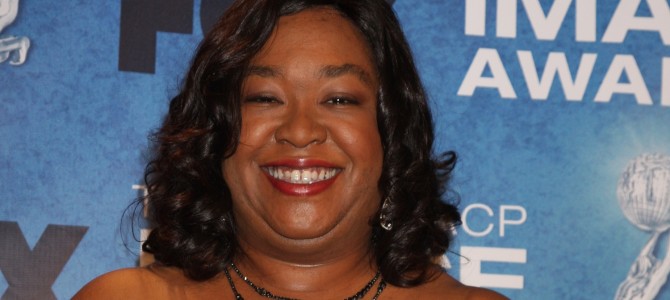Planned Parenthood and celebrities recently touted as brave and unprecedented Shonda Rhimes’s decision to have a character go through with an abortion in the winter finale of “Scandal” while “Silent Night” played in the background.
This is a conversation we need to be having. I'm beyond proud of @ShondaRhimes for one of the bravest storylines I've ever seen. #Scandal
— Portia de Rossi (@portiaderossi) November 20, 2015
Thanks to @shondarhimes for standing with Planned Parenthood & for being groundbreaking creator! #Scandal #StandWithPP
— Planned Parenthood (@PPact) November 20, 2015
Planned Parenthood even released this statement after the show aired:
Tonight, the millions of people who tune into Scandal every Thursday night learned that our rights to reproductive health care are under attack. Never one to shy away from critical issues, [showrunner] Shonda Rhimes used her platform to tell the world that if Planned Parenthood lost funding for contraception counseling, STI testing, cancer screenings, and safe, legal abortion — millions of people would suffer. And this episode wasn’t the first time one of Rhimes’ characters had an abortion, yet tonight we saw one of our favorite characters make the deeply personal decision that one in three women have made in their lifetime. We applaud Shonda Rhimes tonight — and every Thursday night – for proving that when women are telling our stories, the world will pause and watch. We just hope those in Congress — and throughout the nation — who are steadfast on rolling the clock back on reproductive health care access are taking note.
Shonda herself wants credit for doing “research” that resulted in an entire episode dedicated to reciting Planned Parenthood’s talking points.
What research? The writers of "Scandal" repeated @PPact's talking points, along with its debunked "3 percent" lie. https://t.co/gMpTO68k3J
— Lila Rose (@LilaGraceRose) November 23, 2015
The problem is, it’s not brave to use talking points from an abortion provider as dialogue, nor is this the first time Rhimes—creator, head writer, and producer for “Scandal,” “Grey’s Anatomy,” and “Private Practice”—has used characters that her audience has come to love and identify with for blatantly political messaging.
On “Grey’s Anatomy,” Cristina Yang decided to abort her husband’s child over his objections. The reasoning was sloppy at best—mostly for convenience and to hurt her husband by declaring he did not deserve a say in the fate of his own child. Rhimes’s spin-off, “Private Practice,” spent numerous storylines allowing OB/GYN Addison Montgomery to pontificate about abortion and even agree to abort a 19-week-old baby despite the objections of the ostensibly “pro-life” partial owner of the practice.
The following seasons made a hypocrite of the pro-life character: she had a change of heart on abortion when her own daughter became pregnant. Strange dialogue always occurred in these moments, usually as a placeholder to insert a particular talking point. The characters in these cases often lost integrity and consistency for the viewers, often leading to declines in viewership as Shonda pushed the politics harder once her audience was set.
In the case of “Scandal,” Olivia Pope’s unexpected abortion just doesn’t ring true for her character. She makes a living controlling everything, yet we are to believe she somehow got pregnant without meaning to. The whole episode read like Planned Parenthood talking points and used a beloved character to send the message that abortion is no big deal. If you were not offended already, they set the scene to “Silent Night” just to dig the knife in a little further (no pun intended).
Aside from the abortion issue, the episode highlights the particular appeal of ShondaLand shows. She often portrays women as selfish, isolated, and dismissive of the men who love them. Despite all these features, these women still somehow attract men. The women on these shows behave like teenage girls despite having high-powered careers. Sit through seasons watching Meredith Grey’s drama or listening to Addison wonder why she’s single, and you too may scream at the TV, “Because you are awful!”
Shonda isn’t doing anything unprecedented or brave here. She’s telling her audience what they want to hear. No matter how awful they act in ShondaLand, it’s all okay. That’s the fantasy. Something brave would be showing a fully capable and emotionally available woman on television, or empathy for the father who loses his child without a say in the matter. Even more intriguing would be characters that question how a woman of considerable wealth with a male partner who is willing to be a father still can justify choosing to abort their child.
Those questions would be brave, but one suspects Shonda and her audience don’t want to hear them. Perhaps Hollywood could consider that more than half of women in the United States are pro-life-leaning, or more people may tune them out when they co-opt shows with beloved characters for political purposes.
Last nights episode of #Scandal was nothing other than an advertorial for @PPact
I am sick of being "lectured to" and done with this show.
— Jellenne (@jellen805) November 20, 2015
@PPact @shondarhimes. Sad sad sad. 3% ? IF true…3% too much. Shameful cover for "supporting women". Never watching #Scandal again.
— Jamie McHenry (@jamiemchenry315) November 20, 2015









